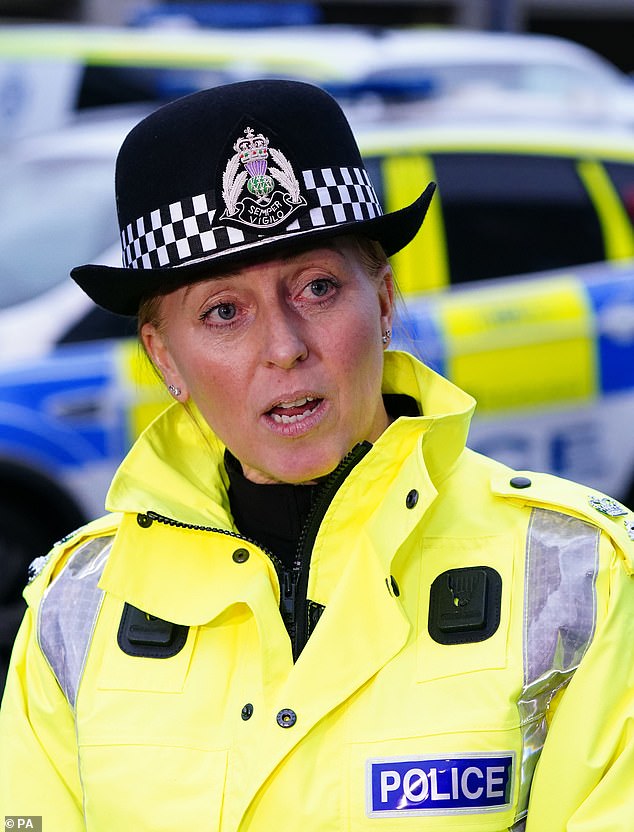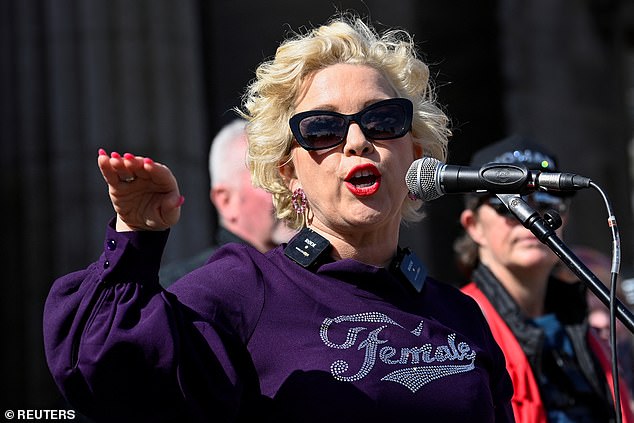Police have issued new guidance ruling transgender suspects can demand one half of their body is searched by a male officer and the other by a female colleague.
Gender-critical campaigners have accused Police Scotland of potentially putting female staff at risk with new rules drawn up after a recent Supreme Court verdict.
The latest guidance – issued with comments from Assistant Chief Constable Catriona Paton – has been condemned by activists including Kellie-Jay Keen, of the group Let Women Speak, and Sex Matters charity chief Fiona McAnena.
Judges determined in April that the word ‘woman’ meant a biological female and not gender within the terms of Britain’s Equality Act.
Police Scotland – the crime force covering the whole country – carried out a review in response to April’s judgment and has now published what it calls ‘interim transgender search guidance’.
A statement described searching as a ‘complex and important area of policing’.
Police Scotland said the force ‘must ensure that it is acting in line with its duties under the Equality Act and the Human Rights Act, and that officers and staff feel confident that they are conducting searches lawfully’.
Among the new guidance is a question-and-answer section, which inclludes the suggestion: ‘Can a transgender detainee ask for a separate area search depending on anatomical presentation?’

Police Scotland’s Assistant Chief Constable Catriona Paton (pictured) has described searching suspects as ‘a complex and important area of policing’

Kellie-Jay Keen, who runs campaign group Let Women Speak, has criticised the new Police Scotland statement – saying female officers are potentially being put at risk

Sex Matters charity chief Fiona McAnena (pictured) has also raised concerns
The reply provided states: ‘Yes – a transgender detainee can ask for a separate area search.
‘This means that one half of their body will be searched by one biological sex officer and the other half of their body will be searched by a different biological sex officer.’
The guidance has been sparked concerns among gender-critical campaigners, who worry female officers would be left in uncomfortable and even risky situations.
Kellie-Jay Keen, who runs the group Let Women Speak, told MailOnline: ‘I’m worried about the rights of female officers, if they’re subjected to the whims of a suspect.
‘I’d be asking the police force for single-sex searches – otherwise women aren’t safe. It’s just beyond belief that messages like this are being sent out.’
Ms McAnena, director of campaigns at the charity Sex Matters, said: ‘This ludicrous policy that allows one half of a suspect’s body to be searched by a woman and the other half by a man comes from a police force which has embraced transgender ideology.
‘Police Scotland’s new rule is a gift to any suspect who may get satisfaction or enjoyment from being disruptive.
‘This is particularly the case for trans rights activists who take an interest in eroding boundaries and making women uncomfortable.’
The new Police Scotland statement comes just weeks after a controversy over similar searches for prison inmates identifying as transgender.
MailOnline reported last month how female prison guards were having to strip search the top half of transgender inmates before male colleagues check their lower region.
Trans criminals held at HMP Dovegate described how two female guards are used to check the top half of their bodies while two male colleagues check below the belt.
The inmates subjected to the searches say they feel ‘humiliated and violated’ by the additional checks by male officers, which leaves their confidence ‘shattered’.
However, women’s rights campaigners accused prison bosses of breaching the ‘human rights’ of female officers.
April’s ruling by the Supreme Court in London deemed the definition of a woman to be based on biological sex, meaning transgender women are not considered to be women in the eyes of the law.
The verdict means trans women with a gender recognition certificate could potentially be excluded from single-sex spaces if ‘proportionate’.
Police Scotland has now said in a statement: ‘The Service has been reviewing affected areas of operational policing, including the procedure for conducting certain kinds of searches, to provide clarity to our colleagues and communities.
‘The guidance states that officers and staff will undertake all searches whether in custody or as part of a stop and search interaction, which involve the removal of more than a jacket, gloves, headgear or footwear, on the basis of biological sex.
‘The guidance also states that when an individual, whose lived gender differs from their biological sex is subject to search and requests to be searched by an officer of their lived gender, efforts will be made to ensure an appropriate officer conducts the search, where this is operationally viable to do so.
‘In these circumstances written consent will be required from the authorising officer (Inspector rank or above), the person to be searched, and the officer(s) conducting the search.’
The force said the approach followed advice from its legal team, ‘as well as engagement with relevant business areas, staff associations, trade unions, the Scottish Government and other key partners’.











